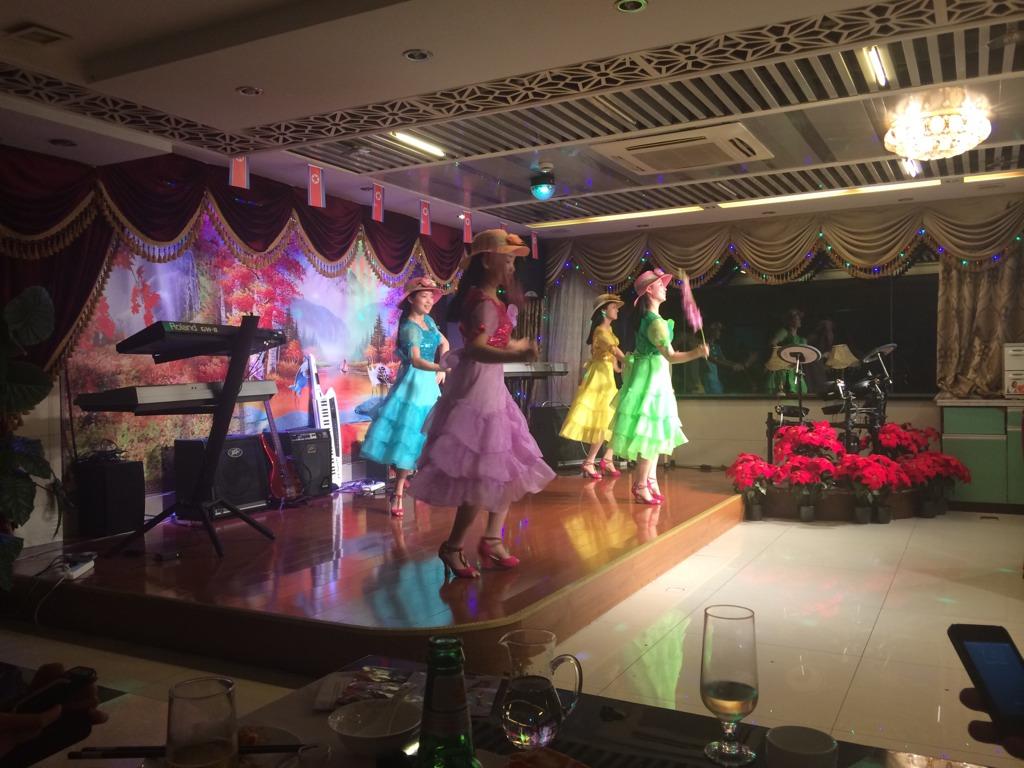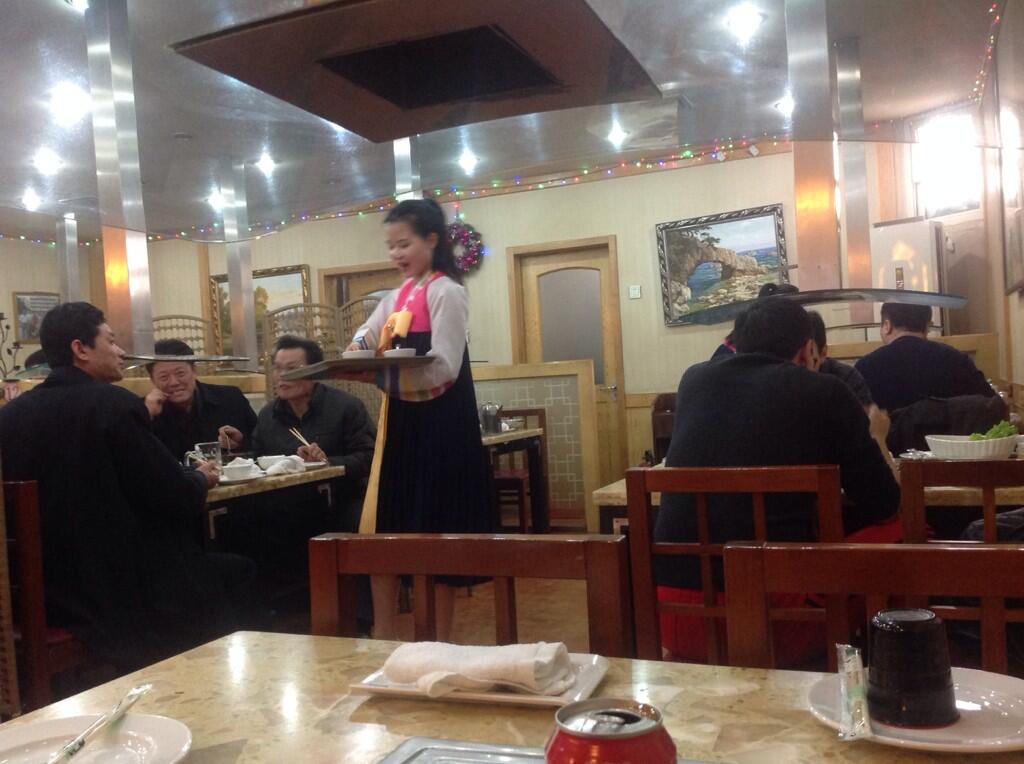The weird world of North Korea’s restaurants abroad

North Korean women perform and serve drinks in the Arirang restaurant in Yanji, China, in July 2015. The restaurant is run and staffed by North Koreans, with the vast bulk of the profits going back to Pyongyang. (Anna Fifield/The Washington Post)
On Friday, authorities in Seoul announced that 13 North Koreans had defected to the South this week. While such defections aren't exactly rare, the manner of this defection was: All of the defectors had been working in the same North Korean restaurant in an unnamed third country.
Jeong Joon-hee, a spokesperson for South Korea's unification ministry, said that the restaurant workers — one male manager and 12 other employees — had arrived in South Korea on Thursday. "It marked the first time that a group of North Koreans at the same restaurant has opted to come to South Korea at once," Jeong said.
The case brings renewed attention to one of the more unusual aspects of North Korea's foreign policy: its restaurant business. As Korean food has risen in popularity around the world, Pyongyang has opened a number of state-run restaurants in other countries. And while these restaurants may function as a form of soft power, promoting North Korea around the world, their immediate aim is more simple: They provide hard cash for the financially isolated Hermit Kingdom.
So how exactly do these restaurants work? Here's an overview.
What the restaurants are like
At current count, there are more than 100 North Korean restaurants around the world, mostly branded under the Pyongyang restaurant chain (Okryugwan, a famous restaurant from Pyongyang, also operates branches abroad). These restaurants first existed in China for decades, but after the 1990s they gradually spread throughout much of Southeast Asia. Nowadays, they can be found in surprisingly far-flung places: There's a Pyongyang restaurant in Dubai, for example, and one opened in Amsterdam, though it later renamed itself and eventually closed.
North Korea in Dubai. (@ 대장금(Daejangkeum Korean Restaurant)) 4sq.com/1fttSzO
Food-wise, these restaurants serve some North Korean staples: There's Pyongyang's famous cold noodle dish, known as naengmyeon in Korean. North Korean kimchi, notably spicier than the South's version, can be found in many dishes. Perhaps most intriguingly, dog is often served, and Korean liquors can be bought, though, like the food, they are expensive.
The entertainment might be just as important as the food, however. At these restaurants, the traditionally dressed female servers also double as entertainers — playing instruments and singing North Korean songs to diners. It may sound propagandistic, but most diners seem to appreciate it more as kitsch.
Overall, these diners seem to be mostly happy with their dining experience, though many seem to appreciate the novelty more than anything else. There is a hint of secrecy about the restaurants, however: Guests are ordered not to take photographs of the restaurants (though many do) and the servers will usually avoid talking openly with guests. Writing about her experience in the Pyongyang restaurant in Phnom Penh, one Tripadvisor user observed: "One needs to accept the presence of smokers, 'minders' and surveillance. Was that a camera overhead in the women's toilet?"
How they make money
North Korea's expansion of its overseas restaurant business began in the 1990s, when the country was reeling from the loss of its Soviet Union patron and a devastating famine that killed hundreds of thousands at home. Isolated by sanctions, the North Korean regime was struggling for hard currency with which to pay China for imports and moved to expand the restaurant business.
North Korea has more than 100 restaurants in about 25 countries, mostly in China and southeast Asia, but also in Russia and Dubai. The restaurants have become a major source of foreign currency for the cash-strapped Pyongyang regime. (Anna Fifield/The Washington Post)
Swedish journalist Bertil Lintner has reported that the North Korean restaurant business is part of "Room 39," a special office of the Korean Workers Party designed to generate cash, which may explain the high prices. Compared to the other alleged activities of Room 39 — drug smuggling and counterfeiting, for example — a restaurant business may seem mundane, but it's still an important cog in the machine. In 2007, one defector told Daily NK, a website run by activists who oppose the North Korean regime, that restaurants in China would send back as much as $30,000. A more recent estimate from South Korean newspaper Chosun Daily put the figure higher, at as much as $300,000.
"The restaurants are used to earn additional money for the government in Pyongyang — at the same time as they were suspected of laundering proceeds from North Korea's more unsavory commercial activities," Lintner told Slate in 2010. "Restaurants and other cash-intensive enterprises are commonly used as conduits for wads of bills, which banks otherwise would not accept as deposits."
Given their purpose, some argue that dining in North Korean state restaurants is immoral, and South Korea's Foreign Ministry recently advised its citizens to avoid dining in the restaurants. It should be noted, however, that not all North Korean restaurants have a direct link to the state: For years, there was a North Korean restaurant in Northern Virginia, which was run by a defector, though it has since closed.
Who works at the restaurants
The workers at these restaurants are among tens of thousands of North Koreans who get sent abroad to earn money for Pyongyang. Compared to the other foreign work possibilities — things like mining, logging or perhaps even fighting in Syria, if rumors are to be believed — working at a restaurant is a relatively good job that can pay better than the alternatives.
Those chosen to be waitresses in the restaurants would have to not only be young, attractive, multilingual and perhaps musically talented: Reports from the Daily NK suggest that they are often from elite Pyongyang families. Their patriotism is key. The staff sent to the restaurants are expected to serve out their multi-year contract with little contact with the community outside of it, working long hours and not venturing outside without a minder.
There have been a number of defections over recent years from North Korean restaurants, though largely these have been one-offs. The sudden exodus, en masse, of the staff of a restaurant is clearly unusual and would have required some planning and coordination — risky moves for a North Korean worker abroad. According to the South Korean government, the workers had defected after watching South Korean television shows and realizing that life there seemed better.
There have been signs that North Korean restaurants have been struggling recently. Radio Free Asia recently cited North Korean sources in China who said that many restaurants have been largely empty because of a lack of South Korean customers and rising tensions with the Chinese government. There have been reports that some restaurants in China have recently closed their doors and that staff members in some restaurants had stopped receiving salaries.






No comments:
Post a Comment